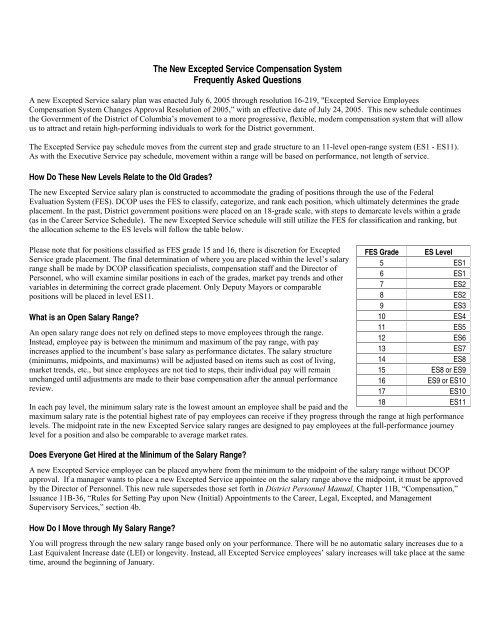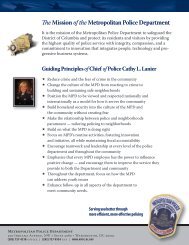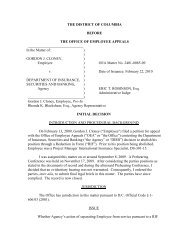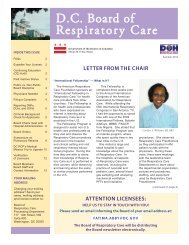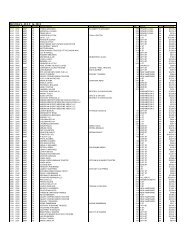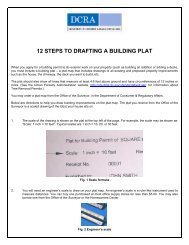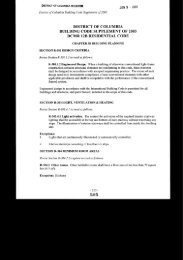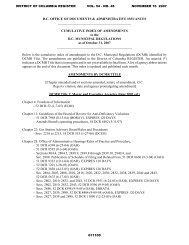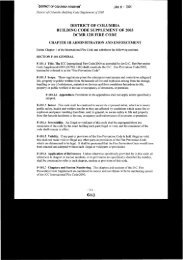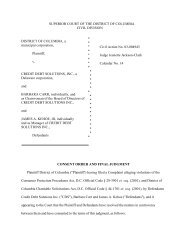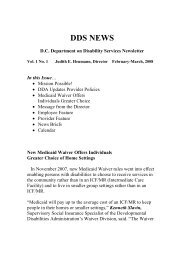excepted service â merit pay plan administration - News Room, DC
excepted service â merit pay plan administration - News Room, DC
excepted service â merit pay plan administration - News Room, DC
Create successful ePaper yourself
Turn your PDF publications into a flip-book with our unique Google optimized e-Paper software.
The New Excepted Service Compensation System<br />
Frequently Asked Questions<br />
A new Excepted Service salary <strong>plan</strong> was enacted July 6, 2005 through resolution 16-219, "Excepted Service Employees<br />
Compensation System Changes Approval Resolution of 2005,” with an effective date of July 24, 2005. This new schedule continues<br />
the Government of the District of Columbia’s movement to a more progressive, flexible, modern compensation system that will allow<br />
us to attract and retain high-performing individuals to work for the District government.<br />
The Excepted Service <strong>pay</strong> schedule moves from the current step and grade structure to an 11-level open-range system (ES1 - ES11).<br />
As with the Executive Service <strong>pay</strong> schedule, movement within a range will be based on performance, not length of <strong>service</strong>.<br />
How Do These New Levels Relate to the Old Grades<br />
The new Excepted Service salary <strong>plan</strong> is constructed to accommodate the grading of positions through the use of the Federal<br />
Evaluation System (FES). <strong>DC</strong>OP uses the FES to classify, categorize, and rank each position, which ultimately determines the grade<br />
placement. In the past, District government positions were placed on an 18-grade scale, with steps to demarcate levels within a grade<br />
(as in the Career Service Schedule). The new Excepted Service schedule will still utilize the FES for classification and ranking, but<br />
the allocation scheme to the ES levels will follow the table below.<br />
Please note that for positions classified as FES grade 15 and 16, there is discretion for Excepted<br />
Service grade placement. The final determination of where you are placed within the level’s salary<br />
range shall be made by <strong>DC</strong>OP classification specialists, compensation staff and the Director of<br />
Personnel, who will examine similar positions in each of the grades, market <strong>pay</strong> trends and other<br />
variables in determining the correct grade placement. Only Deputy Mayors or comparable<br />
positions will be placed in level ES11.<br />
What is an Open Salary Range<br />
An open salary range does not rely on defined steps to move employees through the range.<br />
Instead, employee <strong>pay</strong> is between the minimum and maximum of the <strong>pay</strong> range, with <strong>pay</strong><br />
increases applied to the incumbent’s base salary as performance dictates. The salary structure<br />
(minimums, midpoints, and maximums) will be adjusted based on items such as cost of living,<br />
market trends, etc., but since employees are not tied to steps, their individual <strong>pay</strong> will remain<br />
unchanged until adjustments are made to their base compensation after the annual performance<br />
review.<br />
FES Grade<br />
ES Level<br />
5 ES1<br />
6 ES1<br />
7 ES2<br />
8 ES2<br />
9 ES3<br />
10 ES4<br />
11 ES5<br />
12 ES6<br />
13 ES7<br />
14 ES8<br />
15 ES8 or ES9<br />
16 ES9 or ES10<br />
17 ES10<br />
18 ES11<br />
In each <strong>pay</strong> level, the minimum salary rate is the lowest amount an employee shall be paid and the<br />
maximum salary rate is the potential highest rate of <strong>pay</strong> employees can receive if they progress through the range at high performance<br />
levels. The midpoint rate in the new Excepted Service salary ranges are designed to <strong>pay</strong> employees at the full-performance journey<br />
level for a position and also be comparable to average market rates.<br />
Does Everyone Get Hired at the Minimum of the Salary Range<br />
A new Excepted Service employee can be placed anywhere from the minimum to the midpoint of the salary range without <strong>DC</strong>OP<br />
approval. If a manager wants to place a new Excepted Service appointee on the salary range above the midpoint, it must be approved<br />
by the Director of Personnel. This new rule supersedes those set forth in District Personnel Manual, Chapter 11B, “Compensation,”<br />
Issuance 11B-36, “Rules for Setting Pay upon New (Initial) Appointments to the Career, Legal, Excepted, and Management<br />
Supervisory Services,” section 4b.<br />
How Do I Move through My Salary Range<br />
You will progress through the new salary range based only on your performance. There will be no automatic salary increases due to a<br />
Last Equivalent Increase date (LEI) or longevity. Instead, all Excepted Service employees’ salary increases will take place at the same<br />
time, around the beginning of January.
Every year during the specified rating period, employees in the Excepted Service must have their performance formally reviewed by<br />
their supervisor through the Performance Management Program (PMP). Currently, these reviews are completed by early December.<br />
Based on the final performance rating you receive, a determined percentage increase shall be added to your base wage, as long as the<br />
new base salary does not exceed the current range maximum. No salary increases will be rewarded during any optional midyear<br />
evaluations.<br />
How Will My Annual Salary Increase Be Determined<br />
Your progression through an Excepted Service level will be based only on performance, but the determined percentages will be made<br />
up of two components: a small cost of living increase and a <strong>merit</strong> increase.<br />
In the traditional step <strong>plan</strong>s (the former system), the cost of living was considered the <strong>plan</strong>’s structural adjustment (paid for by<br />
Workforce Investment Funds), while the progression to the next salary step was a reward for longevity (paid for by the agency’s<br />
budget). In this new system, this longevity element is replaced with variable <strong>pay</strong> based on performance, also known as <strong>merit</strong> <strong>pay</strong>.<br />
At the beginning of each fiscal year, the Office of the Chief Financial Officer and <strong>DC</strong>OP will issue the percentage increases that will<br />
be associated with each performance rating level. Once performance ratings are finalized, agency HR Advisors can begin processing<br />
actions.<br />
Can I Still Receive an Incentive Award<br />
Managers can still nominate an Excepted Service employee to receive an Excepted Service Performance Incentive award of up to ten<br />
percent (10%) of the employee’s salary. See the District Personnel Manual, Chapter 9, “Excepted Service,” for more details. This<br />
new Excepted Service salary structure only changes the way Excepted Service base compensation is administered.<br />
Will There Be Any Additional Training on How to Conduct Performance Evaluations<br />
Because Excepted Service salary increases, as well as performance incentives, are based on the Performance Management Program<br />
employee evaluation, <strong>DC</strong>OP recommends that supervisors either sign up for a Performance Management training course through the<br />
Center for Workforce Development or contact the Office of Performance Management, at (202) 727-1742, to arrange a consultation<br />
for your agency’s managers.<br />
How Do Promotions Work<br />
If you receive a promotion that moves you from an Excepted Service position in a lower ES range to a new position in a higher ES<br />
range, you shall receive a 10% increase in your annual base <strong>pay</strong>, assuming that it does not exceed the maximum of the new appointed<br />
range. If you are appointed to a new Excepted Service position in the same ES salary range, you will not receive any increase in base<br />
<strong>pay</strong>.<br />
If you receive a demotion or are appointed to a new Excepted Service position in a lower ES level, you will remain at your current<br />
salary when you transfer to the new level. If your current salary exceeds the maximum salary of the new ES level, your <strong>pay</strong> will be<br />
designated as a “retained rate” and you will not receive any additional base <strong>pay</strong> increases until the <strong>pay</strong> range for your new position<br />
catches up with your current salary. District Personnel Manual, Chapter 11B, “Compensation.” has more information about retained<br />
rates in section 1141.<br />
If you transfer between an Excepted Service position and one in any of the other <strong>service</strong>s (e.g., Career Service, Management<br />
Supervisory Service), any change in salary will be handled in accordance with regulations set forth in guidelines in District Personnel<br />
Manual, Chapter 11B, “Compensation.”<br />
How Will Capital City Fellows Receive Pay Increases<br />
Currently, a Capital City Fellow with a performance rating of Meets Expectations or better receives an increase from a Grade 12, Step<br />
1 to a Grade 12, Step 4 after their first year. Under the new compensation system, a Capital City Fellow will initially be appointed to<br />
the minimum of the ES 6 level. If their performance rating is Meets Expectations or better, after their first year they will receive a 10<br />
percent <strong>pay</strong> increase within the ES 6 level.<br />
If you need additional information about the new Excepted Service Compensation System, please contact the <strong>DC</strong> Office of Personnel,<br />
Office of Classification and Compensation, at (202) 442-3204.


